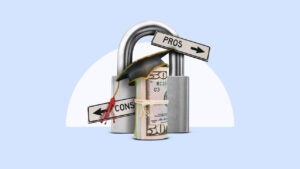Are Sallie Mae student loans federal or private?

Key takeaways
- Sallie Mae offers a variety of private loan options, including undergraduate student loans, graduate student loans and career training loans.
- Sallie Mae student loans can cover up to 100 percent of your education costs, while federal loans come with borrowing caps that might not cover all your expenses.
- Shopping for student loans with Sallie Mae can make sense, but don’t forget to compare borrowing options from other lenders.
While Sallie Mae once offered federal student loans, the lender has only offered private student loans since 2014. All of its previously funded federal loans have been sold to Navient, another servicer. Sallie Mae is now considered a fully private student loan company.
What types of loans and services does Sallie Mae offer?
Sallie Mae private student loans can cover up to the cost of attendance at eligible schools, minus any financial aid a student receives.
Types of Sallie Mae student loans available today include the following:
- Undergraduate student loans: These loans come with fixed or variable interest rates. Students can qualify for an autopay discount, and there are no origination or prepayment penalties.
- Graduate student loans: Graduate student loans from Sallie Mae are available for students pursuing an MBA, medical school, dental school, law school and other health professions.
- Career training loans: Career training loans are also available for professional training and trade certificate courses. Interest rates can be fixed or variable.
What is the best way to borrow money for college?
Because federal student loans come with competitive fixed interest rates and protections like deferment and forbearance, most borrowers would be better off relying on these loans before they borrow with private student loans. Most federal student loans are also available without a credit check, meaning students who are new to building credit can typically access them.
Note that federal student loans are the only type that can qualify for student loan forgiveness programs currently available, including Income Based Repayment (IBR) and Public Service Loan Forgiveness (PSLF).
Since federal student loans have strict borrowing limits, many students opt to use private student loans to fill in funding gaps. These loans can come with competitive interest rates and repayment terms, but private loans require borrowers to have good credit or a cosigner with good credit in order to be approved.
Alternative private lenders to Sallie Mae
While you should rely on federal student loans to fund school first and foremost, private student loans can help fill in funding gaps and help you move toward graduation. In addition to Sallie Mae, there are other private student loan companies to consider.
Ascent
Ascent offers a variety of loans that cover undergraduate and graduate study, as well as career training and trade school. Interest rates for Ascent student loans can be fixed or variable, and funding may be available with or without a cosigner. Student loans for parents are also available through this lender.
This company is also known for offering private student loans for international and DACA students. Ascent student loans also let you defer payments until nine months after graduation.
College Ave
College Ave offers undergraduate student loans, graduate student loans, borrowing options for parents, as well as career training loans. Interest rates for their loans can be fixed or variable, and loans are offered with no origination fees.
Repayment terms can last from five to 15 years for undergraduate student loans, and the same terms are available for graduate loans. Advertised rates for College Ave student loans include an autopay discount.
SoFi
SoFi offers competitive rates and terms, along with several perks that can make their loans more competitive. For example, customers can earn a cash bonus of up to $250 if they maintain a GPA over 3.0.
Student loans from SoFi also come with no origination fees or late fees. Repayment terms can last from five to 15 years.
Bottom line
Sallie Mae may be a good choice if you’re in the market for private student loans and other financial products. Be sure to do your research upfront before you take out any form of financing. Comparing multiple offers always gives you the best chance of saving money.
Frequently asked questions
Why we ask for feedback Your feedback helps us improve our content and services. It takes less than a minute to complete.
Your responses are anonymous and will only be used for improving our website.
You may also like

Types of student loans and how to choose one

Pros and cons of private student loans




